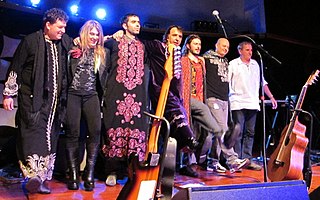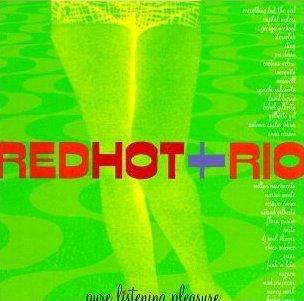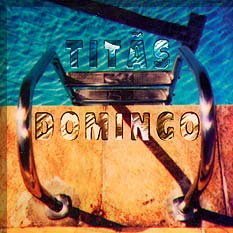
Caetano Emanuel Viana Telles Veloso is a Brazilian composer, singer, guitarist, writer, and political activist. Veloso first became known for his participation in the Brazilian musical movement Tropicalismo, which encompassed theatre, poetry and music in the 1960s, at the beginning of the Brazilian military dictatorship that took power in 1964. He has remained a constant creative influence and best-selling performing artist and composer ever since. Veloso has won nine Latin Grammy Awards and two Grammy Awards. On November 14, 2012, Veloso was honored as the Latin Recording Academy Person of the Year.

Gilberto Passos Gil Moreira, known professionally as Gilberto Gil, is a Brazilian singer, guitarist, and songwriter, known for both his musical innovation and political activism. From 2003 to 2008, he served as Brazil's Minister of Culture in the administration of President Luiz Inácio Lula da Silva. Gil's musical style incorporates an eclectic range of influences, including rock, Brazilian genres including samba, African music, and reggae.

Os Mutantes are an influential Brazilian rock band that were linked with the Tropicália movement, a dissident musical movement during the Brazilian dictatorship of the late 1960s. They released their acclaimed self-titled debut album in 1968.

Red Hot + Rio is a compilation album produced by Béco Dranoff and Paul Heck as part of the Red Hot AIDS Benefit Series intended to promote AIDS awareness. This installment is a contemporary tribute to the bossa nova sound, especially the music of Antonio Carlos Jobim. This release has proven to be one of the Red Hot series' more successful projects, generating hundreds of thousands of dollars for AIDS charities around the world.
Love, Strings and Jobim is a 1966 album by various Brazilian artists who play new Brazilian songs by various composers. Because Antonio Carlos Jobim is pictured on the cover and mentioned in the title, he has been and continues to be credited to be the performing artist on the album. Jobim does not appear on the album except as a composer. The original Brazilian title of this album is "Tom Jobim Apresenta" and it appeared on the Elenco label.

Domingo(Sunday) is the eighth studio album released by Brazilian rock band Titãs. The album became a gold record in Brazil. It is the second Titãs album produced by Jack Endino.

Elizeth Moreira Cardoso, was a singer and actress of great renown in Brazil.
The following is the discography of Brazilian rock band Titãs.
Sucessos Inesquecíveis de Elis Regina is a five-disc CD-set of songs performed by Brazilian singer Elis Regina, including compositions by Milton Nascimento, Gilberto Gil, Rita Lee, Tom Jobim, Belchior, João Bosco, Ary Barroso, Ivan Lins, and Carlos Lyra. The choice of songs was based on recommendations by some 8,000 subscribers of the magazine "Seleções" and numerous musicians. Each disc follows a certain theme as indicated by the title for each.
Extra is an album by Brazilian singer and composer Gilberto Gil, released in 1983. The album, like much of Gil's '80s work, was influenced by reggae.

Gil e Jorge is a 1975 album featuring collaboration between Brazilian musicians Jorge Ben and Gilberto Gil. The two perform together alongside percussionist Djalma Corrêa on each of the songs, improvising and interacting directly throughout.

Gilberto Gil is the second studio album by Gilberto Gil, originally released in early 1968. The album features a blending of traditional Brazilian styles such as samba and bossa nova with American rock and roll. It also mixes Rogério Duprat's orchestral arrangements with the electric guitars of Brazilian rock group Os Mutantes.

I Love Brazil! is a 1977 studio album by Sarah Vaughan, accompanied by prominent Brazilian musicians Milton Nascimento, Dori Caymmi, and Antônio Carlos Jobim.
The discography of Brazilian singer Maria Bethânia consists of 34 studio albums, 15 live albums, several participations in movie and telenovela soundtracks as well as numerous collaborations with other artists.
Improviso Negro is an album by Brazilian samba-jazz group Sambalanço Trio released in 1965.

Dina El Wedidi, is an Egyptian singer, composer, guitarist, duf drum player, actress, and storyteller. Dina has been known as the lead performer of an ensemble of musicians who have performed extensively in the past 2 years, fusing local and global styles of music.

Gilberto Gil is the third solo album by Gilberto Gil, originally released in 1969. The album was arranged by Rogério Duprat, and has a strong element of psychedelic rock to it, being considered by some to be his most experimental album. Since Gil was not allowed by the Brazilian military dictatorship to leave Salvador, Bahia, before being exiled to London, he recorded vocals and acoustic guitar in Salvador, and Rogério Duprat recorded the other instruments in Rio de Janeiro and São Paulo.

Aloísio or Aloysio de Oliveira, also known as Louis Oliveira, was a Brazilian record producer, singer, actor and composer. A key figure in the internationalization of Brazilian popular music, he contributed to Carmen Miranda's career abroad with his own musical ensemble: Bando da Lua, which he founded in 1929 with Hélio Jordão Pereira, Afonso Osório, Stênio Osório, Armando Osório, Osvaldo Éboli, Ivo Astolfi, Diego Astolfi and some other cousins of the latter for a total of 12 people. With the death of Miranda in August 1955 the group disbanded. Back in Brazil, Aloísio directed the command of Odeon Records, then created his own record label: the Elenco, producing dozens of discs and launching important names of bossa nova as Tom Jobim.

Expresso 2222 is the fifth studio album by Brazilian artist Gilberto Gil, released in June 1972 by Philips Records. In October 2007, the magazine Rolling Stone's Brazilian edition published a list of the 100 Greatest Albums of Brazilian Music, in which Expresso 2222 featured at number 26.

Quanta gente veio ver: Ao Vivo, known internationally as Quanta Live, is a Grammy-winning 1998 album by Brazilian musician Gilberto Gil recorded live with a seven-piece band at the Teatro João Caetano in Rio de Janeiro during his 1997 world tour. At the 41st Annual Grammy Awards, it won the award for Best World Album. The album's tracks span a number of musical styles, including tropicalia, a genre with which Gil is closely associated, as well as samba, funk, bossa nova, reggae, jazz, salsa, and pop.














